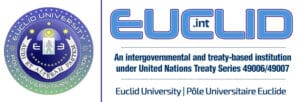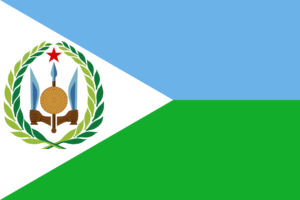![]() EUCLID is an intergovernmental, treaty-based university; its constitutive treaty, as registered and published in the United Nations Treaty Series (certificates 49006/49007).
EUCLID is an intergovernmental, treaty-based university; its constitutive treaty, as registered and published in the United Nations Treaty Series (certificates 49006/49007).
Its primary and historic headquarters have been located in Bangui (Central African Republic) as Headquarters State, since 2011. EUCLID is accredited by the Ministry of Higher Education of the Headquarters State.
EUCLID’s global ECOWAS headquarters are located in Greater Banjul (Republic of The Gambia) as Headquarters State, since 2013. EUCLID is accredited by the National Accreditation and Quality Assurance Authority (NAQAA).
![]() UN-level recognition is attested by a letter from the United Nations, Office of Human Resources Management, (reference 0218/RCA/MP/ONU-12), dated 10 December 2012: “the UN Secretariat recognize[s] Euclide – Pole Universitaire Euclide and the other four UN institutions … as being accredited.” EUCLID is listed under its French name in the UN Inspira database of approved universities for employment in the US system.
UN-level recognition is attested by a letter from the United Nations, Office of Human Resources Management, (reference 0218/RCA/MP/ONU-12), dated 10 December 2012: “the UN Secretariat recognize[s] Euclide – Pole Universitaire Euclide and the other four UN institutions … as being accredited.” EUCLID is listed under its French name in the UN Inspira database of approved universities for employment in the US system.
![]() EUCLID, (or as applicable the EUCLID Secretary-General), is a member of institutional associations requiring government recognition/accreditation, notably AAU and IAUP.
EUCLID, (or as applicable the EUCLID Secretary-General), is a member of institutional associations requiring government recognition/accreditation, notably AAU and IAUP.
![]() EUCLID has been certified to UNESCO/IAU in the current update cycle. Accordingly, EUCLID is listed in the UNESCO/IAU World Higher Education Database (WHED) with ID IAU-024734.
EUCLID has been certified to UNESCO/IAU in the current update cycle. Accordingly, EUCLID is listed in the UNESCO/IAU World Higher Education Database (WHED) with ID IAU-024734.
Letter from the United Nations, Office of Human Resources Management, reference 0218/RCA/MP/ONU-12: “the UN Secretariat recognize[s] Euclide – Pole Universitaire Euclide and the other four UN institutions … as being accredited.”
ACCREDITATION, RECOGNITION AND RELEVANT MEMBERSHIPS OR LISTINGS
| Charter | Treaty authority, Article I, UNTS 49006/49007) |
Since 2008 |
| CAR National Accreditation | Institutional Accreditation by Government / Ministry of Higher Education (Central African Republic) | Since 2011 and current |
| Gambia National Accreditation | Institutional Accreditation by the National Accreditation and Quality Assurance Authority (NAQAA). | Since 2022 and current |
| Other Government / IGO Recognition | By formal agreement with the governments and relevant ministries of the Host States | Since 2011 and 2013 |
| Apostille (Hague Convention Authentication) | Yes, by formal HQ Protocol | Ministry of Foreign Affairs (CAR) |
| Executive-Level (Presidential)? | the EUCLID SG is a member of IAUP |
Since 2012 |
| Regional Memberships | Yes (AAU) and AUAP |
Since 2012 |
| UNESCO NATCOM listing | Yes | Since 2013 |
| Other Participations | GUNI, UN Academic Impact, ACUNS |
Since 2011 and 2012 |
| Other Publication(s) | United Nations Treaty Series (search database for “EUCLID”) |
Since 2011 |
| UNESCO/IAU listing? | Yes (“International / Regional” category) |
Since 2011 |
| Usable for UN & IGO positions? | Yes (per letter from UN Secretariat). EUCLID is included in the UN Inspira database. | Since 2012 |
| Listed for UN staff sabbaticals? | Yes |
Since 2013 |
| CHEA (USA) accreditation | No (EUCLID is not a US-based institution and limits US enrollment) |
Current |
| SAQA (South Africa) | Now approved for evaluation as foreign and accreditation institution |
Current |
| HEC (Pakistan) | Approved equivalency on file |
Current |
| Egypt | Approved authentication on file |
Current |
UNDERSTANDING GLOBAL ACCREDITATION
Prospective students should take note that governmental and intergovernmental bodies are the only official and reliable authorities in the matter of university status and accreditation/recognition. Private and sub-national entities claiming authority to approve or disapprove institutions of higher learning are often deceptive, or fraudulent.
Typically, public national (or regional) universities are accredited by a single ‘accrediting body’ which is either the ministry of education (MOE) or a specialized agency approved by the ministry of education. This governmental approval is deemed sufficient for international accreditation and recognition. In addition, there are private accrediting bodies with various levels of validity and recognition (the United States does not have a ministry of education and relies on private accreditors).
Typically, public intergovernmental universities are now accredited by the accrediting body of their headquarters state (Ministry of Education / Higher Education or other delegated public agency), in addition to other accreditation and recognition statements incorporated in their charter.
OTHER & SIMILAR MULTILATERAL UNIVERSITIES
The following table summarizes the accreditation processes and documentation for the major intergovernmental universities including EUCLID:
Multilateral Institution | Accreditation Mechanism and Documentation | HQ |
Ministry of Education of Italy + statements by other EU States | Link | Florence | |
Ongoing with Ministry of Education of Japan (2014/2015) + statement by UN Secretariat | Link 1 | Link 2 | Tokyo | |
Ministry of Education of Tanzania | Link | Arusha | |
Accreditation agency for Costa Rica + United Nations General Assembly & Treaty support | Link 1 | Link 2 | San Jose | |
Ministry of Education of Senegal? Regional CAMES label | Link | Dakar | |
Confirmed authorization Ministry of Education of Sweden (2014) |Link | Malmö | |
Probably via Ministry of Education of Malta but not documented | Valleta | |
Public Foundation | Not degree granting | Trieste | |
Network of Universities | Not degree granting | Saarbrücken | |
Bi-national institution | Accreditation not documented | Grenoble | |
Possible accreditation by the Ministry of Education of Kyrgyzstan (not documented) | Bishkek | |
Not degree granting, no accreditation | Kinshasa* | |
Treaty Article 7, UGC India | Link | New Delhi | |
Ministry of Education of The Gambia | Link | Banjul | |
Ministry of Education of Turkey + approval by Germany under international law | Ankara | |
Validity confirmed by Ministry of Education of Thailand | Link | Pathum Thani |
This post is also available in: French









